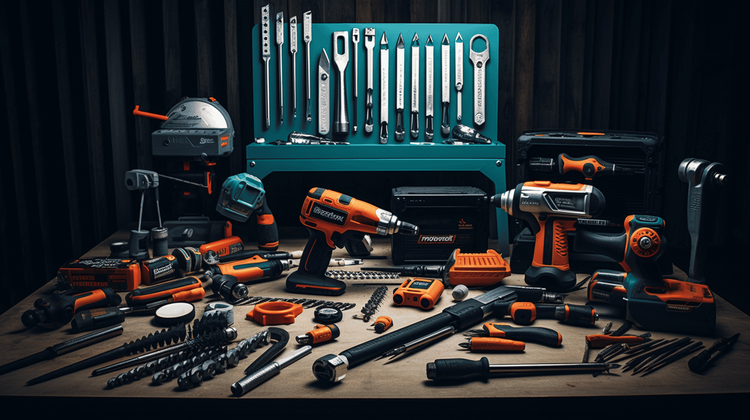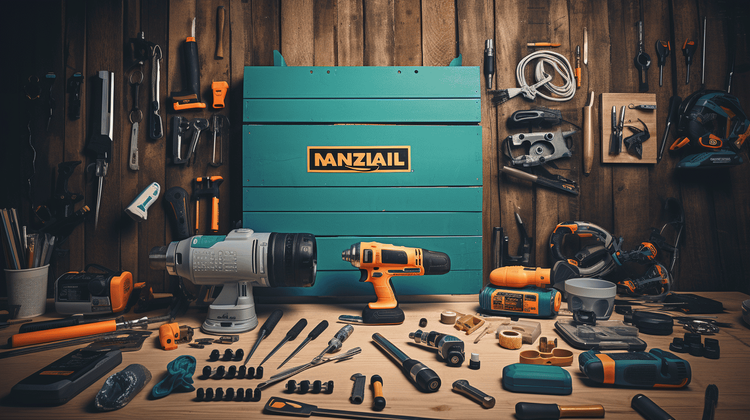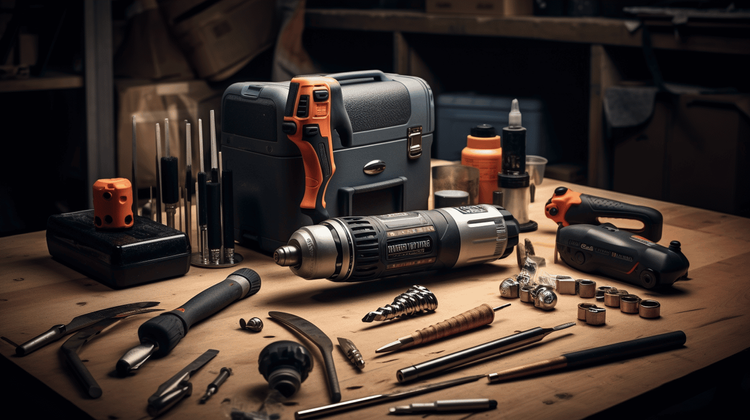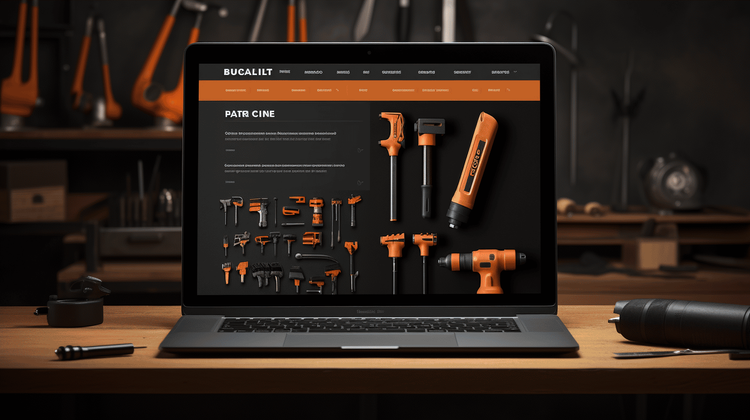Budget DIY: Tips for Finding Quality Tools at Affordable Prices

Hey there! Are you a DIY enthusiast looking to tackle some projects around the house? Or maybe you're a professional contractor in need of reliable tools that won't break the bank? Well, you've come to the right place!
In this article, we're going to share some invaluable tips on how to find quality tools at affordable prices. We understand that budget-friendly options are essential, but at the same time, you don't want to compromise on the quality and durability of your tools. That's why we're here to help you navigate the world of tool shopping and make informed decisions.
Finding the right tools doesn't have to be a daunting task. With a little research and smart shopping strategies, you can equip yourself with high-quality tools without emptying your wallet. So let's dive in and discover the best ways to find tools that are both affordable and reliable!
"Investing in good tools is an investment in yourself." - Alex Spanos
Research and Comparison
When it comes to finding quality tools at affordable prices, doing your research and making comparisons is key. By taking the time to identify your tool needs, research different brands and models, and compare prices and retailers, you can find the best deals and ensure that you're getting tools that meet your requirements. Here are some tips to help you with your research and comparison process:
Identify Your Tool Needs
Before you start your search for tools, it's important to identify exactly what you need. Ask yourself questions like:
- What specific tasks do I need the tool for?
- What features or specifications are important to me?
- Do I have any brand preferences?
By answering these questions, you can narrow down your options and focus on finding the tools that are best suited to your needs.
Research Tool Brands and Models
Once you have a clear idea of what you're looking for, it's time to research different brands and models. Look for reputable brands known for their quality and durability. Consider reading customer reviews and ratings to get insights into the performance and reliability of different tools.
Compare Prices and Retailers
When it comes to finding affordable tools, comparing prices is essential. Don't settle for the first price you come across. Take the time to visit different websites, local stores, and even ask for recommendations from friends or colleagues. Make note of the prices at each place and compare them to find the best deal.
Remember, price isn't the only factor to consider. Some retailers may offer additional benefits like warranties or customer support, which can add value to your purchase.

Creating a comparison table with different features, prices, and retailers can also help you make an informed decision. It allows you to see all the information at a glance and easily compare the options.
By conducting thorough research and making comparisons, you can ensure that you're getting the best tools at the most affordable prices. It may take some time and effort, but it's well worth it in the long run. So, grab your laptop, get ready for some online window shopping, and find the tools that will help you tackle your projects without breaking the bank!
Consider Used or Refurbished Tools
When it comes to finding quality tools at affordable prices, one option worth considering is buying used or refurbished tools. While some people may be hesitant to purchase pre-owned tools, there are actually many benefits to doing so. In this section, we'll explore the advantages of buying used or refurbished tools and provide some tips for doing so safely.
Benefits of Buying Used or Refurbished Tools
- Cost Savings: The most obvious advantage of buying used or refurbished tools is the cost savings. Used tools are often significantly cheaper than their brand-new counterparts, allowing you to stretch your budget further.
- Quality Brands at a Lower Price: By opting for used or refurbished tools, you may be able to afford higher-quality brands that would be out of your price range if purchased new. This means you can still enjoy the benefits of top-notch tools without breaking the bank.
- Rapid Depreciation: Unlike many other products, tools tend to depreciate rapidly in value. This means that even slightly used tools can often be found at significantly reduced prices, making them a great option for budget-conscious DIYers.
- Eco-Friendly: Buying used or refurbished tools is also a more environmentally friendly choice. By giving new life to tools that would otherwise end up in landfills, you're contributing to the reduction of waste and the conservation of resources.
Tips for Buying Used Tools Safely
- Inspect the Tool: Before purchasing a used tool, examine it carefully to ensure it is in good working condition. Look for any signs of wear and tear, rust, or damage. Test the tool if possible to make sure it functions properly.
- Buy from Reputable Sellers: When buying used tools, it is important to buy from reputable sellers who have a track record of selling quality products. Online marketplaces like eBay and Craigslist can be great resources, but exercise caution and read reviews before making a purchase.
- Ask for Documentation or Warranty: If you're purchasing a refurbished tool, check if it comes with any documentation or a warranty. This will provide you with peace of mind knowing that the tool has been inspected and refurbished by professionals.
- Research Fair Market Prices: Before making a purchase, do some research to determine the fair market price for the tool you're interested in. This will help you avoid overpaying and ensure you're getting a good deal.
- Meet in Person if Possible: If buying a used tool online, try to arrange a meeting with the seller in person rather than having the item shipped. This way, you can inspect the tool firsthand and ensure it meets your expectations.
Remember, buying used or refurbished tools can be a great way to save money without sacrificing quality. By following these tips, you can make informed decisions and find tools that will serve you well for your DIY projects.
Shop Online for Deals
When it comes to finding quality tools at affordable prices, one of the best options is to shop online. Online shopping offers a range of benefits, including convenience, a wide selection of products, and the opportunity to compare prices easily. Here are some tips for getting the best deals on tools when shopping online:
Benefits of Online Shopping for Tools
- Convenience: Shopping for tools online allows you to browse and purchase products from the comfort of your own home. No more driving from store to store or dealing with crowded aisles.
- Wide Selection: Online retailers typically have a larger selection of tools compared to brick-and-mortar stores. You can find a variety of brands, models, and sizes at your fingertips.
- Price Comparisons: Online shopping makes it easy to compare prices from different retailers. You can quickly find the best deals and discounts without having to visit multiple stores.
Popular Online Platforms for Tool Shopping
When shopping for tools online, it's important to choose a reputable platform that offers reliable products and good customer service. Here are some popular online platforms that are known for their quality tools:
- Amazon: With its vast selection of tools and numerous customer reviews, Amazon is a go-to platform for many DIY enthusiasts. You can find a wide range of brands and models at competitive prices.
- eBay: eBay is a great platform for finding both new and used tools. Many sellers on eBay offer great deals, and you can often find unique or discontinued models that are no longer available in stores.
- Home Depot: While Home Depot is primarily a brick-and-mortar store, they also have a robust online presence. Their website offers a wide variety of tools, and they often have online-exclusive deals and discounts.
Utilizing Discounts and Coupons
To score even better deals when shopping for tools online, be sure to take advantage of discounts and coupons. Here are some tips to help you save even more:
- Sign up for newsletters: Many online retailers offer exclusive discounts to their newsletter subscribers. Sign up for newsletters from your favorite tool retailers to stay updated on the latest promotions.
- Check for coupon codes: Before making a purchase, do a quick search for coupon codes that you can apply at checkout. Websites like Honey or RetailMeNot often have codes that can save you money.
- Wait for sales: Keep an eye out for seasonal sales like Black Friday or Cyber Monday, where many online retailers offer significant discounts on tools and other products.
Remember, when shopping online, it's important to read customer reviews and product descriptions carefully. Check the seller's return policy and shipping costs to ensure a smooth online shopping experience.
By utilizing the benefits of online shopping and exploring different platforms, you can find quality tools at affordable prices without even leaving your home. Don't forget to take advantage of discounts and coupons to maximize your savings. Happy tool shopping!
Explore Local Hardware Stores and Yard Sales
When it comes to finding quality tools at affordable prices, local hardware stores and yard sales can be hidden gems. These places not only offer a wide range of tools, but they often have lower prices compared to big-name retailers. So, if you're on a budget and looking to add some new tools to your collection, let's explore why you should consider exploring local hardware stores and yard sales.
Advantages of Shopping at Local Hardware Stores
1. Access to Expert Advice: One of the biggest advantages of shopping at local hardware stores is the access to knowledgeable staff. Unlike big-box retailers where you may struggle to find someone who can provide guidance, local hardware store employees are often specialists in their field. They can answer your questions, provide recommendations, and help you choose the right tools for your needs.
2. Unique and Hard-to-Find Tools: Local hardware stores often carry a variety of unique and hard-to-find tools that may not be available at larger retailers. These specialty tools can be essential for specific projects and can make your DIY tasks much easier. Plus, it's always exciting to discover a tool you never knew existed!
3. Personalized Service: Shopping at local hardware stores provides you with a more personalized shopping experience. The staff is typically more attentive and willing to assist you in any way they can. They can even help you troubleshoot any tool-related issues or provide advice on how to tackle a particular project.
Tips for Finding Good Deals at Yard Sales
Yard sales are another excellent option for finding quality tools at affordable prices. Here are some tips to help you make the most of your yard sale tool hunting:
1. Plan Ahead: Check local listings or online platforms for upcoming yard sales in your area. Make a list of the tools you're looking for, so you know exactly what to prioritize.
2. Arrive Early: Getting to yard sales early gives you the best chance of finding the best tools before anyone else snatches them up. So, set your alarm and be ready to start your tool hunt bright and early.
3. Inspect the Tools Thoroughly: Before purchasing any tools at a yard sale, take the time to thoroughly inspect them. Look for signs of wear or damage that might affect their functionality. It's also a good idea to test any power tools, if possible, to ensure they're in working condition.
4. Negotiate the Price: Don't be afraid to negotiate the price with the seller. Yard sales are often an opportunity for sellers to clear out their items, so they may be willing to negotiate a lower price. Just be polite and respectful in your negotiations.
5. Make Connections: Building relationships with frequent yard sale hosts or local tool enthusiasts can be valuable for finding great deals. They may be willing to give you a heads up about upcoming sales or even sell tools directly to you outside of a sale.
Local hardware stores and yard sales can be treasure troves for finding quality tools at affordable prices. So, next time you're in need of new tools, give these local options a try. You never know what hidden gems you might stumble upon!
Renting Tools for Short-Term Projects
If you have a short-term project that requires specific tools, renting them can be a cost-effective solution. Rather than investing in expensive tools that you may only use once or twice, renting allows you to access the tools you need without breaking the bank. Here are some benefits of renting tools for short-term projects and tips for finding reliable tool rental services.
Benefits of Renting Tools
Renting tools for short-term projects offers several advantages:
- Cost Savings: Renting tools is generally cheaper than buying them outright, especially for tools that you may not use frequently. You can avoid the upfront cost of purchasing tools and save money in the long run.
- Access to Specialized Tools: Some projects require specialized tools that may be expensive to buy. Renting allows you to get access to those specialized tools without the financial commitment of purchasing them.
- No Need for Storage: If you don't have a dedicated workshop or storage space, renting tools is ideal. You can return the tools once your project is complete, eliminating the need to find space to store them.
- Professional Grade Tools: Tool rental services often provide professional-grade tools, giving you access to high-quality equipment that you may not be able to afford or justify buying for a one-time project.
Finding Reliable Tool Rental Services
When it comes to renting tools, it's important to find a reliable tool rental service that offers quality tools and excellent customer service. Here are some tips to help you find a reputable tool rental service:
- Research and Read Reviews: Before choosing a tool rental service, do some research online and read customer reviews. Look for feedback on the quality of the tools, customer service, and overall satisfaction.
- Ask for Recommendations: Seek recommendations from friends, family, or colleagues who have rented tools in the past. They can provide valuable insights and recommend reliable rental services.
- Visit the Store: If possible, visit the tool rental store in person. Take a look at their inventory, assess the condition of the tools, and speak to the staff to get a sense of their knowledge and expertise.
- Check Rental Policies: Review the rental policies of different tool rental services. Look for information on rental fees, return policies, damage coverage, and any additional charges. Make sure the policies align with your needs and budget.
- Inspect Tools Before Renting: Before renting any tools, inspect them carefully for any signs of damage or wear. Ensure that the tools are in good working condition and ask the rental service about their maintenance procedures.
- Ask About Support and Assistance: Inquire about the level of support and assistance provided by the rental service. Do they offer guidance on how to use the tools? Are there troubleshooting resources available? A reliable rental service should be able to assist you throughout your rental period.
Renting tools for short-term projects is a practical and cost-effective option. By choosing a reputable tool rental service and following these tips, you can ensure that you have the right tools for your project without the financial commitment of buying them outright.
Remember, always prioritize safety when working with rented tools. Read and follow the manufacturer's instructions, wear appropriate safety gear, and take necessary precautions to avoid accidents.
Prioritize Quality and Durability
When it comes to purchasing tools, it's important to prioritize quality and durability. While it may be tempting to go for the cheapest option available, investing in high-quality tools will save you money in the long run. Quality tools are not only more reliable, but they also tend to last longer and perform better, ultimately giving you better results.
Here are some reasons why you should prioritize quality and durability when buying tools:
Understanding the Importance of Quality
- High-quality tools are made with better materials and superior craftsmanship, resulting in better performance and longer lifespan.
- Quality tools are more resistant to wear and tear, reducing the need for frequent replacements.
- They offer better ergonomics and comfort, making them easier to use and reducing the risk of hand fatigue or injuries.
- Quality tools are designed with precision, ensuring accurate and precise results.
- They often come with warranties or guarantees, giving you peace of mind and assurance of their longevity.
Choosing Tools that Last
When shopping for tools, here are some tips for selecting tools that are built to last:
- Research tool brands: Look for reputable brands with a history of producing high-quality tools. Brands like DEWALT, Bosch, and Milwaukee are known for their durability and performance.
- Read customer reviews: Reviews from other users can give you valuable insights into the quality and durability of a particular tool. Look for patterns in reviews that highlight any issues or praises regarding durability.
- Inspect the tool: If possible, inspect the tool in person before purchasing. Check for any signs of poor construction or flimsy materials. Look for solid construction and check if the tool feels sturdy in your hands.
- Check the warranty: A good warranty is an indication that the manufacturer stands behind their product's quality. Look for tools with longer warranties or extended guarantees.
- Consider user ratings: Online platforms or retailers often have user ratings or product rankings that can give you an idea of the tool's overall quality and durability.
Remember, investing in quality tools may require a higher upfront cost, but the long-term benefits far outweigh the initial expense. Don't compromise on quality for the sake of saving a few bucks. By choosing quality and durable tools, you'll not only get the job done right but also save yourself from the hassle of frequent repairs or replacements.
"The bitter taste of poor quality lingers long after the sweetness of low price is forgotten." - Benjamin Franklin
Maintaining and Repairing Your Tools
Taking care of your tools is essential if you want them to last and perform at their best. Regular maintenance and timely repairs can save you money in the long run and ensure that you always have reliable tools on hand. Here are some tips to help you maintain and repair your tools effectively:
Proper Tool Maintenance Practices
Keeping your tools in good condition requires a little bit of effort, but it's worth it in the long run. Here are some key maintenance practices to follow:
- Clean tools regularly: After each use, make sure to clean your tools thoroughly to remove dirt, debris, and any other substances that may have accumulated on them. This will prevent rust and keep your tools in optimal condition.
- Oil moving parts: For tools with moving parts, such as wrenches or pliers, a small amount of lubricant can go a long way in preventing friction and keeping them running smoothly. Apply a few drops of oil to the joints and pivot points regularly.
- Inspect for damage: Regularly inspect your tools for any signs of wear and tear, such as cracks, chips, or loose handles. Addressing these issues early on can prevent further damage and potential accidents.
- Store properly: Proper storage is crucial for tool maintenance. Make sure to keep your tools in a dry, clean, and organized place. Use toolboxes, racks, or pegboards to keep them protected and easily accessible.
- Sharpen blades: If you have tools with blades, such as knives or shears, it's important to keep them sharp. Dull blades not only hinder performance but can also pose safety risks. Use a sharpening stone or a file to maintain a sharp edge.
Repairing Tools Yourself
While some tool repairs may require professional help, there are many simple repairs that you can do yourself. Not only will this save you money, but it will also empower you to take better care of your tools. Here are some common DIY repairs:
- Handle replacement: If a tool's handle becomes loose or damaged, you can often replace it yourself. Many hardware stores sell replacement handles, or you can make one yourself using wood or another suitable material.
- Screw tightening: Over time, screws on tools may become loose. If you notice any wobbling or instability, simply tighten the screws using a screwdriver or an appropriate wrench.
- Blade sharpening: As mentioned earlier, keeping blades sharp is essential for optimal tool performance. You can sharpen blades yourself using a sharpening stone or a file. Just be sure to follow the correct technique for the specific tool.
- Cord replacement: If you have power tools with frayed or damaged cords, you can replace them yourself. However, it's important to exercise caution when working with electrical components. Follow safety guidelines and consider professional help if you're unsure.
Remember, safety should always be your top priority. If a repair seems too complex or involves potentially dangerous components, it's best to seek professional assistance.
Proper maintenance and timely repairs not only extend the lifespan of your tools but also ensure that they are safe to use. With a little effort and knowledge, you can keep your tools in excellent condition for years to come. So, take the time to care for your tools, and they will continue to serve you well on all your DIY projects.
Conclusion
In conclusion, finding quality tools at affordable prices is definitely possible with a little bit of research and smart shopping. By identifying your tool needs, researching different brands and models, comparing prices and retailers, considering used or refurbished options, shopping online for deals, exploring local hardware stores and yard sales, renting tools for short-term projects, prioritizing quality and durability, and maintaining and repairing your tools, you can save money without compromising on the quality of your tools. Remember, investing in good tools is a long-term investment that will pay off in the long run.
At Ultra Handy, we understand the importance of having reliable tools for getting things done. We have a wide range of high-quality tools available in our eCommerce Amazon store that cater to individuals who enjoy doing things with their own hands, as well as those who love spending time outdoors. Check out our store here to find the perfect tools for your DIY projects and outdoor adventures.
Remember, with the right tools, you can tackle any project or task with confidence. Happy budget DIY-ing!
Frequently Asked Questions
- Where can I find affordable tools for my DIY projects?You can find affordable tools for your DIY projects at hardware stores, online marketplaces like Amazon, eBay, or local classified ads. Additionally, consider checking out thrift stores, garage sales, or borrowing tools from friends or family.
- Are budget tools of lower quality?Not necessarily. While some budget tools may be of lower quality, there are several options available that provide good value for money. Look for reputable brands with positive customer reviews and check for warranties or guarantees to ensure quality.
- What are some tips for getting discounts on tools?Some tips for getting discounts on tools are: 1. Wait for sales or special promotions. 2. Consider purchasing second-hand tools in good condition. 3. Compare prices online to find the best deals. 4. Sign up for newsletters or loyalty programs of tool suppliers for exclusive discounts.
- How can I ensure the tools I buy are suitable for my projects?Before buying tools, make a list of the specific tasks or projects you need them for. Research the different types and features of tools required and read customer reviews to ensure they meet your requirements. It's also helpful to consult with experienced DIYers or professionals for advice.
- Should I invest in cordless or corded tools?The choice between cordless and corded tools depends on your specific needs. Cordless tools offer mobility and convenience but require battery replacements. Corded tools provide consistent power but require a power source nearby. Consider the type of projects you'll be working on and your personal preference before deciding.




